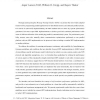Free Online Productivity Tools
i2Speak
i2Symbol
i2OCR
iTex2Img
iWeb2Print
iWeb2Shot
i2Type
iPdf2Split
iPdf2Merge
i2Bopomofo
i2Arabic
i2Style
i2Image
i2PDF
iLatex2Rtf
Sci2ools
121
click to vote
TPDS
2010
2010
Self-Consistent MPI Performance Guidelines
Message passing using the Message Passing Interface (MPI) is at present the most widely adopted framework for programming parallel applications for distributed-memory and clustered parallel systems. For reasons of (universal) implementability, the MPI standard does not state any specific performance guarantees, but users expect MPI implementations to deliver good and consistent performance in the sense of efficient utilization of the underlying parallel (communication) system. For performance portability reasons, users also naturally desire communication optimizations performed on one parallel platform with one MPI implementation to be preserved when switching to another MPI implementation on another platform. We address the problem of ensuring performance consistency and portability by formulating performance guidelines and conditions that are desirable for good MPI implementations to fulfill. Instead of prescribing a specific performance model (which may be realistic on some sys...
| Added | 31 Jan 2011 |
| Updated | 31 Jan 2011 |
| Type | Journal |
| Year | 2010 |
| Where | TPDS |
| Authors | Jesper Larsson Träff, William D. Gropp, Rajeev Thakur |
Comments (0)

